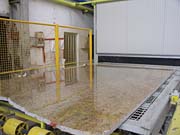

The plant opened in the spring of this year, and it features the latest generation of automated resining machinery from Protec of Italy, including massive dryers that process multiple slabs at once. It also has honing and polishing equipment from Breton, including a newly installed polishing line.
The plant uses resin products from Tenax S.p.A. of Italy, and the resin is either applied automatically or manually, depending on the natural characteristics of the stone being processed. Some brittle or otherwise delicate stones need more attention to detail.
During the production process, slabs are first honed on a Breton line which has 14 heads. They are then placed in a dryer, which removes virtually all moisture from the slab and allows for optimum application of the resin. Next, the resin is applied (and filler is added as needed), and a second dryer the curing process. Some slabs are treated on both sides, and netting is applied to the back as needed. The slabs are then moved via trolley to a Levibreton KG with 17 polishing heads to receive the final polish.
The new plant represents the latest development since Henreaux merged with the Carli family, which also has a rich history in stoneworking. “You cannot have a full plant without a resin line,†said Paulo Carli, head of the company. “It is part of the 'full cycle' of stone production. This allows us to offer full service to our clients. We want to move the company into colored marble and granite varieties with heavy veining. This new technology allows us to have better quality and new products for our clients.â€
Henraux can now offer slabs in unique and exotic materials, such as onyx. Carli also added that historic materials such as Arabescato marble from Carrara can also benefit from resin treatment.
With the new system in place, approximately 60% of the company's slab production is now resin-treated, and the plant can process an average of 200 slabs per day. A total of 80 people work at the factory in Querceta, and there are 130 people working at Henraux in all, including the quarries and stockyards in central and southern Italy.
The main markets for Henraux are the Middle East, the U.S., the Far East, Italy and the remainder of Europe. The U.S. currently represents 30% of the company's business, but that is expected to increase with the new plant in place. “There can be more opportunities for business in the U.S., where clients are looking for assurance in terms of quality,†Carli said.
Overall, slabs represent 70% of the company's business, and cut-to-size work represents 30%, including large-scale cladding projects around the world, custom flooring jobs and ornamental details, among other work. Overall turnover for Henraux is approximately 24 million Euros (U.S. $29.4 million) per year. “Business is okay, but somewhat delicate,†Carli said, citing overall market conditions for Italy as a whole. “We are keeping our position in the market. The challenge now is to grow.â€